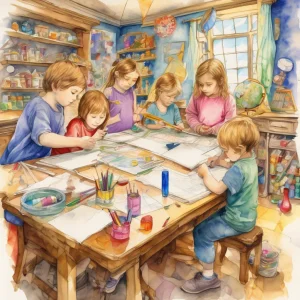Activity
Similar Activities
Enchanted Measurement Adventures: Measuring Real-World Objects Scavenger Hunt
Children’s Age: 5–10 years
Activity Duration: 10 – 20 minutes
An educational activity engaging children in measuring real-world objects through a fun scavenger hunt.
Activity Duration: 10 – 20 minutes
Nature's Objects: Exploring Buoyancy Adventure
Children’s Age: 6–7 years
Activity Duration: 10 minutes
An engaging hands-on activity for children aged 6-7 to explore buoyancy with natural objects.
Activity Duration: 10 minutes
Musical Straw Pan Flute Symphony Adventure
Children’s Age: 6–9 years
Activity Duration: 10 minutes
Create a homemade pan flute using plastic straws to explore music and physics concepts.
Activity Duration: 10 minutes
Cultural Creatures: Stop-Motion Animation Adventure
Children’s Age: 4–9 years
Activity Duration: 10 – 25 minutes
An interactive activity using technology to create stop-motion animations exploring plants and animals from diverse cultures.
Activity Duration: 10 – 25 minutes
World Wonders: The Virtual World Tour Adventure
Children’s Age: 5–18 years
Activity Duration: 35 minutes
Let's go on a Virtual World Tour Adventure! You can discover countries, cultures, and famous landmarks using a computer or tablet with internet access. If you have headphones, you …
Activity Duration: 35 minutes
Empathy Tales: Digital Story Clay Creations
Children’s Age: 3–18 years
Activity Duration: 10 – 25 minutes
In this activity, children aged 3 to 18 years old can explore empathy and creativity through a mix of digital storytelling and clay sculpting. You'll need a tablet or computer, cla…
Activity Duration: 10 – 25 minutes
Space Adventure Obstacle Course: Galactic Learning Journey
Children’s Age: 6–12 years
Activity Duration: 25 minutes
Get ready for an awesome adventure with the Space Adventure Obstacle Course! You'll crawl through cardboard box spaceships, jump over paper tube asteroids, and follow colorful tape…
Activity Duration: 25 minutes
Harmony Haven: Virtual Music Band Challenge
Children’s Age: 10–12 years
Activity Duration: 20 – 30 minutes
Engage children in the "Virtual Music Band Challenge," a fun and educational activity combining music creation with healthy lifestyle tips. Participants will need devices with inte…
Activity Duration: 20 – 30 minutes
Rainbow Shapes: The Creative Color Matching Game
Children’s Age: 3–4 years
Activity Duration: 5 – 20 minutes
The Creative Color Matching Game is an engaging activity designed for children aged 36 to 48 months. It aims to boost color recognition, fine motor skills, and language development…
Activity Duration: 5 – 20 minutes
Eco-Friendly Nature Scavenger Hunt: Discover & Learn
Children’s Age: 11–15 years
Activity Duration: 30 – 40 minutes
Embark on the Eco-Friendly Nature Scavenger Hunt to engage children in nature exploration and ecological learning. This activity promotes communication skills and teamwork while fo…
Activity Duration: 30 – 40 minutes
Enchanted Nature Scavenger Hunt and Discovery
Children’s Age: 6–10 years
Activity Duration: 30 minutes
The "Nature Scavenger Hunt and Data Collection" activity is designed for children aged 6 to 10 to enjoy a fun and educational outdoor experience. By exploring nature and collecting…
Activity Duration: 30 minutes
Enchanted Eco-Friendly Digital Art Gallery Journeys
Children’s Age: 3–4 years
Activity Duration: 20 minutes
The Eco-Friendly Digital Art Gallery activity is tailored for children aged 36 to 48 months to enhance self-regulation skills and eco-consciousness through a creative and education…
Activity Duration: 20 minutes



























